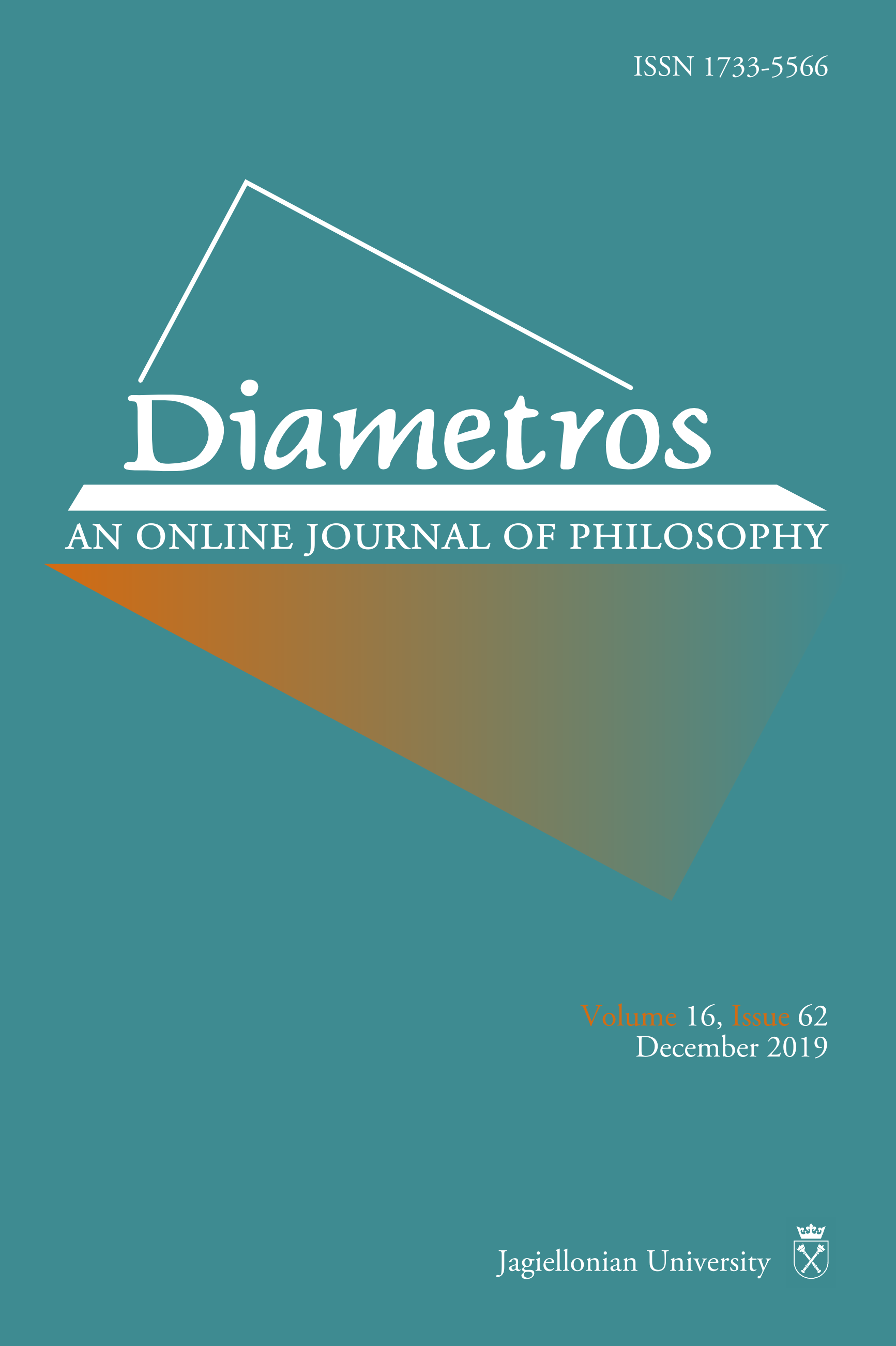Fenomenologia a problem „w sobie” przedmiotu
Main Article Content
Abstrakt
Autor prezentuje własną interpretację fenomenologicznej zagadki „w sobie” przedmiotu rzeczywistego i samego świata. Rozwiązanie tej zagadki ma rozstrzygające znaczenie dla właściwego zrozumienia fenomenologii transcendentalnej. Według Husserla, rzecz transcendentna jest „w sobie” w odniesieniu do faktycznego doświadczenia, ponieważ jej esse nie rozpływa się w percipi i może istnieć nawet wtedy, gdy nie jest faktycznie doświadczana. „W sobie” przedmiotu realnego nie oznacza jednak jego istnienia poza wszelkim możliwym sposobem dania w świadomości, ale jest idealną jednością daną w nieskończonej wielości rzeczywistych i możliwych przejawów tego samego dopuszczającego określenia x. Wszystkie przedmioty realne są jednostkami sensu, ale sens nie przenika przedmiotu w nieskończoności jego przejawów, a w konsekwencji niewyczerpywalne x jako nosiciel tożsamości przedmiotu zawiera nadwyżkę wykraczającą poza sens. Zasadnicza teza artykułu brzmi, że „w sobie” rzeczy transcendentnej i świata realnego odpowiada czystemu x i jego nadwyżce przekraczającej sensy noematyczne.
Article Details
Numer
Dział
Teksty zaproponowane do naszego czasopisma nie powinny być nigdzie publikowane przed ukazaniem się w „Diametros”. Wraz z przesłaniem swojego utworu redakcji autor akceptuje, że w momencie zakwalifikowania tekstu do publikacji czasopismo „Diametros” będzie stosowało licencję the Attribution 4.0 International (CC BY 4.0). Na podstawie tej licencji autorzy zgadzają się, że ich prace mogą być zgodnie z prawem ponownie wykorzystywane do jakichkolwiek celów bez konieczności uzyskania uprzedniej zgody ze strony autora lub wydawcy. Każdy może prace te czytać, pobierać, kopiować, drukować, rozpowszechniać oraz przetwarzać, pod warunkiem poprawnego oznaczenia autorstwa oraz oryginalnego miejsca publikacji. Autorzy zachowują prawa autorskie do swoich utworów bez żadnych innych ograniczeń. Pełna informacja na temat licencji CC BY: https://creativecommons.org/licenses/by/4.0/legalcode.
Jak cytować
Bibliografia
Bernet R. (1979), Perception as a Teleological Process of Cognition, „Analecta Husserliana” 9: 119–132. DOI: https://doi.org/10.1007/978-94-009-9437-9_8
Bernet R., Kern I., Marbach E. (1989), Edmund Husserl. Darstellung Seines Denkens, Felix Meiner Verlag, Hamburg.
Brelage M. (1965), Studien zur Transzendentalphilosophie, Walter de Gruyter & Co, Berlin. DOI: https://doi.org/10.1515/9783110843545
de Palma V. (2005), Ist Husserls Phänomenologie ein Transzendentaler Idealismus?, „Husserl Studies” 21: 183–206. DOI: https://doi.org/10.1007/s10743-005-1462-y
Derrida J. (1992), Przemoc i metafizyka. Esej o myśli Emmanuela Levinasa, tłum. K. Matuszewski,
P. Pieniążek, [w:] J. Derrida, Pismo filozofii, Inter Esse, Kraków: 161–223.
Drummond J. (1990), Husserlian Intentionality and Non-Foundational Realism. Noema and Object, Kluwer Academic Publishers, Dordrecht/Boston/London. DOI: https://doi.org/10.1007/978-94-009-1974-7
Drummond J. (2014), Kontrowersje wokół noematu, tłum. W. Płotka, [w:] Wprowadzenie do fenomenologii.
Interpretacje, zastosowania, problemy, t. 1, W. Płotka (red.), Wydawnictwo IFiS PAN, Warszawa: 226–265.
Føllesdal D. (1969), Husserl’s Notion of Noema, „The Journal of Philosophy” 66: 680–687. DOI: https://doi.org/10.2307/2024451
Husserl E. (1956), Erste Philosophie (1923/24), t. 1: Kritische Ideengeschichte, von R. Boehm (red.), [w:] Husserliana, Gesammelte Werke, Bd. 7, Martinus Nijhoff, Den Haag.
Husserl E. (1973), Ding und Raum. Vorlesungen 1907, von U. Claesges (red.), [w:] Husserliana, Gesammelte Werke, Bd. 16, Martinus Nijhoff, Den Haag.
Husserl E. (1975), Idee czystej fenomenologii i fenomenologicznej filozofii. Księga pierwsza, tłum. D. Gierulanka, Państwowe Wydawnictwo Naukowe, Warszawa.
Husserl E. (1982), Medytacje kartezjańskie, tłum. A. Wajs, Państwowe Wydawnictwo Naukowe, Warszawa.
Husserl E. (1990), Idea fenomenologii. Pięć wykładów, tłum. J. Sidorek, Państwowe Wydawnictwo Naukowe, Warszawa.
Husserl E. (2000a), Badania logiczne, t. 2: Badania dotyczące fenomenologii i teorii poznania, cz. 1, tłum. J. Sidorek, Wydawnictwo Naukowe PWN, Warszawa.
Husserl E. (2000b), Badania logiczne, t. 2: Badania dotyczące fenomenologii i teorii poznania, cz. 2, tłum. J. Sidorek, Wydawnictwo Naukowe PWN, Warszawa.
Husserl E. (2002), Einleitung in die Philosophie. Vorlesungen 1922/23, von B. Goossens (red.), [w:] Husserliana, Gesammelte Werke, Bd. 35, Kluwer Academic Publishers, Dordrecht/Boston/London.
Husserl E. (2003), Transzendentaler Idealismus. Texte aus dem Nachlass (1908–1921), von R.D. Rollinger, R. Sowa (red.), [w:] Husserliana, Gesammelte Werke, Bd. 36, Kluwer Academic Publishers, Dordrecht/Boston/London.
Husserl E. (2004), Wahrnehmung und Aufmerksamkeit. Texte aus dem Nachlass (1893–1912), von T. Vongehr, R. Giuliani (red.), [w:] Husserliana, Gesammelte Werke, Bd. 38, Springer, Dordrecht.
Kern I. (1964), Husserl und Kant. Eine Untersuchung über Husserls Verhältnis zu Kant und zum Neukantianismus, Martinus Nijhoff, Den Haag. DOI: https://doi.org/10.1007/978-94-010-3601-6_5
Łaciak P. (2012), Anonimowość jako granica poznania w fenomenologii Edmunda Husserla, Wydawnictwo Uniwersytetu Śląskiego, Katowice.
Micali S. (2008), Überschüsse der Erfahrung. Grenzdimensionen des Ich nach Husserl, Springer, Dordrecht.
Smith D.W., McIntyre R. (1982), Husserl and Intentionality. A Study of Mind, Meaning and Language, D. Reidel Publishing Company, Dordrecht/Boston/Lancaster.
Strasser S. (1959), Das Gottesproblem in der Spätphilosophie Edmund Husserls, „Philosophisches Jahrbuch der Görres-Gesellschaft” 67: 130–142.
Ströker E. (1987), Intentionalität und Konstitution. Wandlungen des Intentionalitätskonzepts in der Philosophie Husserls, [w:] E. Ströker, Phänomenologische Studien, Vittorio Klostermann, Frankfurt am Main: 54–74.
Zahavi D. (2012), Fenomenologia Husserla, tłum. M. Święch, Wydawnictwo WAM, Kraków.
